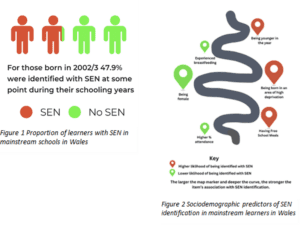-
Dr Cathryn KnightUniversity of Bristol
-
Dr Emily LothianSwansea University
-
Professor Tom CrickSwansea University
Project overview
This project explored the impact of special educational needs (SEN) or additional learning needs (ALN) identification on educational trajectories in Wales.
The Welsh system for supporting learners aged 0-25 with ALNs (ALN, the term that has replaced SEN in Wales) is currently in a state of transition that started in 2022. However, there was no rigorous large-scale evaluation of how the previous system was working to support learners identified with SEN/ALN to attain academically.
Methodology
Data from the SAIL Databank on over 200,000 children in Wales, born between 2002/3 and 2008/9, was used to explore the predictors of being identified with SEN/ALN and examine the factors influencing attainment over time, including sociodemographic factors (e.g., free school meals, season of birth) and health factors (e.g., health service utilization).

Key Findings
Among those born in 2002/3, nearly 1 in 2 learners were identified with SEN/ALN at some point during their education from Reception to Year 11. This challenges the notion that SEN/ALN is an issue affecting only a minority of learners, underscoring the broader relevance and importance of addressing SEN-related concerns in educational policy and practice.
Exploring the predictors of SEN/ALN across all learners in the study revealed a clustering within specific demographic groups. When controlling for health-related factors (health utilisation, gestational age and weight, birth anomalies) and ethnicity, environmental variables including having free school meals (FSM), higher levels of deprivation, lower school attendance (%), being younger in the year, and not experiencing breastfeeding emerge as influential factors shaping whether individuals were identified with SEN/ALN. The school attended by the learner and the local authority in which it was located were much less powerful predictors.
We also found that identified SEN/ALN was the most influential predictor of attainment. Moreover, the more time a learner spent identified with SEN/ALN, the lower their chances of achieving nationally expected educational standards. This underscores the substantial impact of SEN on academic attainment, even after accounting for sociodemographic and health factors which also predict attainment.
Policy Implications and Recommendations
- Inclusive Educational Policies: Develop, implement, and meaningfully evaluate inclusive educational policies that prioritise diversity and support learners to achieve regardless of any identified learning needs.
- More effective cross-government policymaking: Raising academic attainment levels will require a cohesive, collaborative effort that transcends individual teams and addresses the multifaceted challenges associated with ALN.
- Review of ALN identification processes: Current methods used to identify ALN need to be examined and evaluated, with a focus on ensuring accuracy and fairness.






































